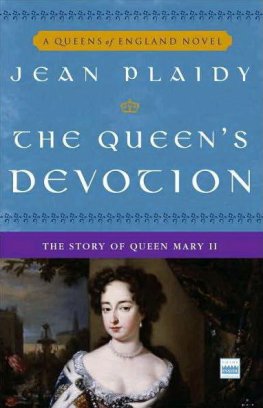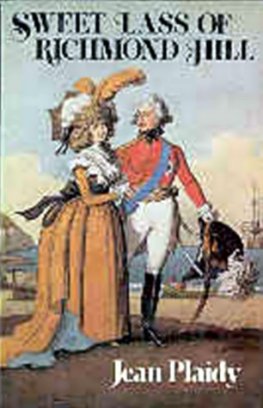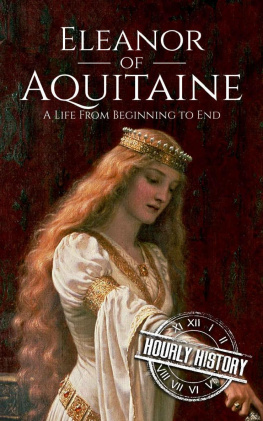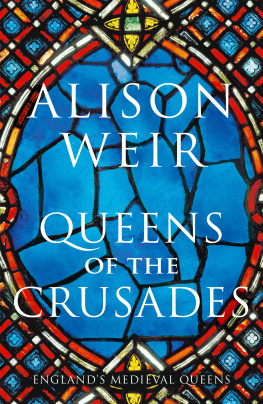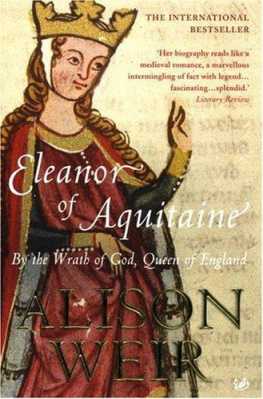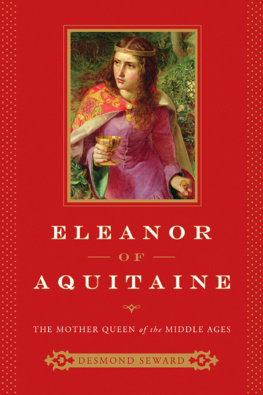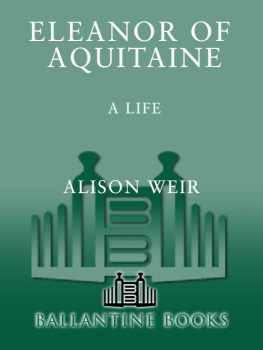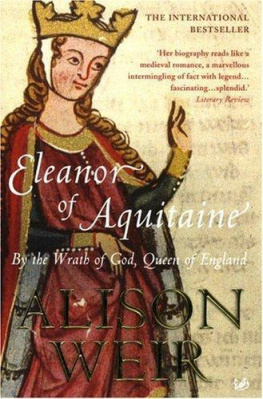Jean Plaidy
The Courts of Love
The Story of Eleanor of Aquitaine
WHEN I LOOK BACK over my long and tempestuous life, I can see that much of what happened to memy triumphs and most of my misfortuneswas due to my passionate relationships with men. I was a woman who considered herself their equaland in many ways their superiorbut it seemed that I depended on them, while seeking to be the dominant partneran attitude which could hardly be expected to bring about a harmonious existence.
I inherited my good looks and fiery passionate nature from my forebearsand my surroundings no doubt played a big part in forming my character, for until I was five years old I lived at the Court of my grandfather, the notorious William IX of Aquitaine, poet, king of the troubadours, adventurer, lecher, founder of the Courts of Love, and the most fascinating man of his day.
It was true that I knew him when he was past his adventuring and had reached that stage when a man who has lived as he had is casting uneasy eyes toward the life hereafter and forcing himself into reluctant penitence; but, all the same, even to my youthful eyes, he was an impressive figure. Engraved on my memory forever are those evenings in the great hall when I sat entranced watching the tumblers and listening to the jongleursand most of all hearing my grandfather himself singing songs of his exploits in those days when he was a lusty young man, roaming abroad in search of love. I thought him godlike. He was as handsome as Apollo, as strong as Hercules and as ingenious a lover as Jupiter. I was sure he could assume any shape in his love adventures. All the songs were of beautiful women, mostly unattainable, which seemed to make them more desirable than they would otherwise have been. Women were glorified in his Court, and when I left Aquitaine and discovered how differently they were treated in other countries I was amazed.
Seated beside him would be the exciting Dangerosa. I had heard her called Dangereuse, which was appropriate. She was tall, statuesque and flamboyantly handsome. He was my fathers father and she was my mothers mother; but they were lovers. Nothing in my grandfathers Court followed conventional lines.
My grandfather often sang of how he had ridden into the castle where he found her; and he had fallen in love with her the moment he set eyes on her. She was married to the Viscount of Chtellerault to whom she had borne three children; but that was no obstacle to my grandfathers passion. He abducted her and brought her to his castlea willing captiveand he set her up in that part of the castle known as the Maubergeonne Tower. Not that her presence was kept a secret. All knew what had happened; and when my grandfathers wife, Philippawho had been away at the timereturned to the castle to find a rival actually in residence, understandably she left my grandfather forever.
I never knew my grandmother Philippa. She died before I was born, but of course I knew the story of that stormy marriage. My grandfathers affairs were openly discussed and he himself sang of them.
However, I was enchanted by my dashing troubadour grandfather and my merry, wicked grandmother, Dangerosa, living in riotous sin together.
I think my mother was a little shocked and would have liked the household to have been run on more orthodox lines. She was Anor, daughter of Dangerosa and the Viscount of Chtellerault; as Dangerosa could not be the Duchess of Aquitaine, she decided that her daughter should marry my grandfathers eldest son so that her grandchild could inherit Aquitaine in due course. This was adding to the unconventionality, and I believe even my grandfather hesitated, but he was so besotted with Dangerosa that he gave in.
Very soon after the wedding, to the delight of all, I appeared. No doubt they would have preferred a boy, but because of the status of women in Aquitaine I was warmly welcomed.
I heard afterward that before I was born one of the holy pilgrims came to the castle. They were always turning up like birds of ill omen. The man was understandably shocked by the situation at the castle: the abduction, the blatant living together of the unmarried pair, and the flight of the true Duchess to Fontevrault Abbey, and to follow that the marriage of the son and daughter of the guilty pair.
He stood before my poor pregnant mother and declared: Nothing good will come of this.
What I am wondering now is: Was the pilgrim right?
Aquitaine is one of the richest provinces in France. It had been a law unto itself since the time of the Romans when the Emperor Augustus divided Gaul into four provinces and added to Aquitaine the land between the Garonne and the Loire. It included Poitou and Gascony and contained some of the most beautiful scenery in France. Fruit and flowers grew in abundance; the grape flourished and the wine was the best to be found anywhere. My grandfather ruled over a prosperous land.
Living was easy in Aquitaine and that made its people pleasure-loving. Nature was indulgent toward us and we were a contented community, my grandfather a popular ruler. People liked his merry ways; they did not care that he was often in conflict with the Church; they did not criticize his way of life; his amorous adventures were a cause for laughter, and his exploits were recounted throughout the Duchy.
I learned a little about him during those five years when I knew him and I discovered a great deal later. He really had an influence on my life, for he it was who set the tone of the Court which my father was later to inherit and which was to continue to be my home during my childhood.
My grandfather had come to the throne when he was fifteen or sixteen years old, and even at that time the pursuit of women seemed to be the great aim of his life. At the Court of Poitou this was considered a lovable failing. Perhaps his ministers thought that such a youth would be easy to handle; they soon found their mistake. He might first and foremost wish to play the part of lover, but he was determined to rule as well and he intended that one pursuit should not deter him from following the other.
It was thought a good idea to get him married quickly. On our northern borders was the province of Anjou, and the daughter of Fulk of Anjou was chosen for William. She was Ermengarde and reckoned to be a great beautyas most royal brides are made out to beand they were married.
He appeared to be delighted for a while but he was not a man to give up old habits, and there was friction between them. Moreover she failed to produce an heira terrible fault in women of noble familiesand there was agreement between them that divorce would be desirable.
This was obtained without too much difficulty but of course a man in my grandfathers position was in duty bound to produce an heir so he must again think of marriage.
An interesting situation had arisen in the neighborhood. Count William of Toulouse had gone to fight in the Holy Land and had been killed. He had a daughter but no son, and his brother, Raymond, immediately seized Toulouse and the title that went with it. Philippa, Count Williams daughter, had married Sancho Ramirez the ruler of Aragon, and, fortuitously, just at this time he was killed in battle, leaving her a widow. William, having heard accounts of her outstanding good looks, decided she was the wife for him and set out to woo her, and with his handsome looks and gift of words he was soon a successful suitor.
At first the marriage was successful. Moreover, inspired by religious fervor, Raymond of Toulouse joined the First Crusade and on the way to the Holy Land met his death; so all my grandfather had to do was ride with Philippa into Toulouse and take it.
While this was happening, Philippa gave birth to a sonmy father.
There was a great deal of religious enthusiasm at that time. A certain monk who had once been a soldier and was the father of several children had what he called a revelation from God and became a recluse. He was known as Peter the Hermit and created a great stir when, having been on a pilgrimage to Jerusalem, he returned with such stories of the manner in which Christians were being treated that he attracted the attention of Pope Urban II. Together they preached about the wickedness of the villainous Turks who were desecrating the Holy Shrine, and such was the mystic power of Peter the Hermit that all over Europe men rallied to his call, eager to join the crusade which was to free Jerusalem from the Infidel.


